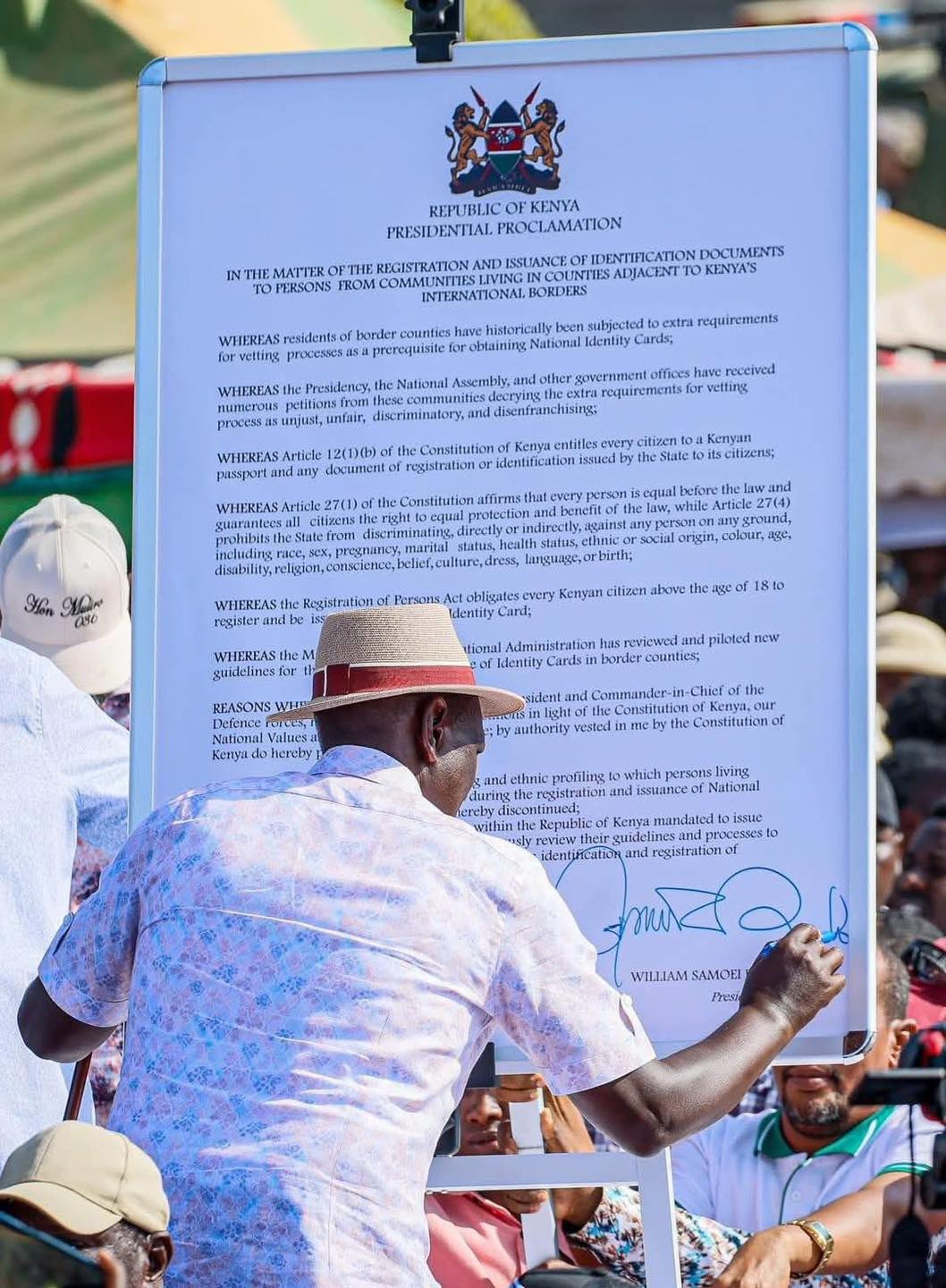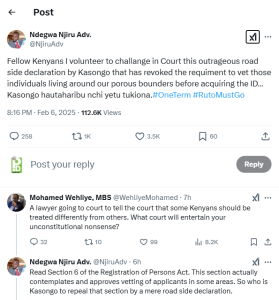Politics
Gachagua’s Lawyer Moves to Court to Stop Ruto’s Directive on ID Vetting in Northern Kenya
He argued that the vetting process was legally grounded, pointing to Section 6 of the Registration of Persons Act, which he claims supports the vetting of applicants in certain regions.

Ndegwa Njiru, a prominent lawyer affiliated with Deputy President Rigathi Gachagua’s political wing, has vowed to contest President William Ruto’s recent decision to abolish the vetting process for National Identification Card (ID) issuance in Kenya’s North Eastern region.
Ruto’s New Directive
President William Ruto, on February 5, 2025, made a significant announcement through a Presidential Proclamation, ending what he described as decades of discriminatory vetting practices in Northern Kenya. The decree was publicly signed and read by Ruto at Orahey Grounds in Wajir Town, where he emphasized the need for all Kenyans to be treated equally in the process of obtaining national documents. “If it’s about vetting, let all children of Kenya be vetted equally without any discrimination,” Ruto stated, aiming to rectify historical injustices and systemic discrimination faced by residents in the North Eastern region.
Njiru’s Legal Challenge
Njiru took to social media platform X to express his intent to challenge this directive. “Fellow Kenyans, I volunteer to challenge in court this outrageous roadside declaration by Kasongo that has revoked the requirement to vet those individuals living around our porous borders before acquiring the ID,” he posted, using a colloquial nickname for the President.
He argued that the vetting process was legally grounded, pointing to Section 6 of the Registration of Persons Act, which he claims supports the vetting of applicants in certain regions.
His stance has not been without controversy. Financial expert Mohamed Wehliye criticized Njiru’s move, questioning the legality and morality of advocating for differential treatment among Kenyan citizens. “A lawyer going to court to tell the court that some Kenyans should be treated differently from others? What court will entertain your unconstitutional nonsense?” Wehliye countered.
Political and Historical Context
The vetting procedures were initially established post the Shifta War in the 1960s, aimed at preventing secessionist movements by ensuring the loyalty of individuals from regions with ethnic Somali populations. Critics, however, argue that these measures have fostered a sense of marginalization and ethnic profiling in the North Eastern region.
Ruto’s decision might also be viewed through a political lens, especially as it comes at a time when the 2027 General Election looms. Analysts speculate that this could be a strategic move to garner support in a region known for its political volatility.
Implications of the Legal Battle
Njiru’s legal challenge could lead to a pivotal court case that will examine the intersection of national security, constitutional rights, and equality before the law. The outcome could influence how ID vetting policies are applied across Kenya, potentially setting a precedent for how similar policies are scrutinized or amended.
The debate has already stirred significant public discourse especially on social media, where opinions are sharply divided. Some support the President’s move towards inclusivity, while others, like Njiru, argue for maintaining established security protocols.
As this legal battle unfolds, it will not only test the judicial interpretation of existing laws but also reflect on Kenya’s broader political and social fabric, particularly how the nation addresses issues of identity, security, and equality. The courts’ decision could very well shape the future policy landscape regarding citizenship documentation in Kenya.
Kenya Insights allows guest blogging, if you want to be published on Kenya’s most authoritative and accurate blog, have an expose, news TIPS, story angles, human interest stories, drop us an email on [email protected] or via Telegram
-

 Investigations2 weeks ago
Investigations2 weeks agoInside Nairobi Firm Used To Launder Millions From Minnesota Sh39 Billion Fraud
-

 News2 weeks ago
News2 weeks agoPastor James Irungu Collapses After 79 Hours Into 80-Hour Tree-Hugging Challenge, Rushed to Hospital
-

 Business2 weeks ago
Business2 weeks agoMost Safaricom Customers Feel They’re Being Conned By Their Billing System
-

 News2 weeks ago
News2 weeks agoUnfit for Office: The Damning Case Against NCA Boss Maurice Akech as Bodies Pile Up
-

 News2 weeks ago
News2 weeks agoTax Payers Could Lose Millions in KWS Sh710 Insurance Tender Scam As Rot in The Agency Gets Exposed Further
-

 News2 weeks ago
News2 weeks agoDeath Traps: Nairobi Sitting on a Time Bomb as 85 Per Cent of Buildings Risk Collapse
-

 News2 weeks ago
News2 weeks agoRaila Bodyguard Maurice Ogeta Appointed As Mombasa Security County Adviser
-

 Investigations6 days ago
Investigations6 days agoKERRA Homa Bay Region Manager Calvince Thomas Accused of Swindling Businessman Ksh 2 Million in Phantom Tender Deal

















